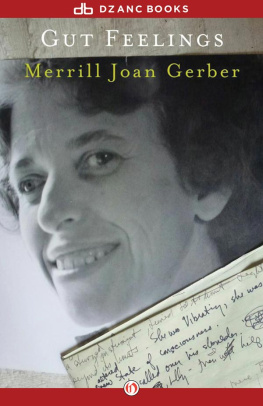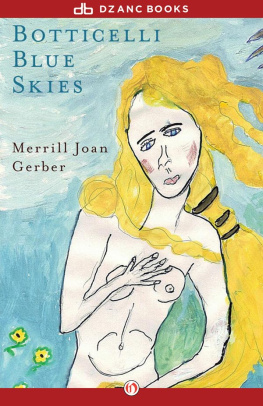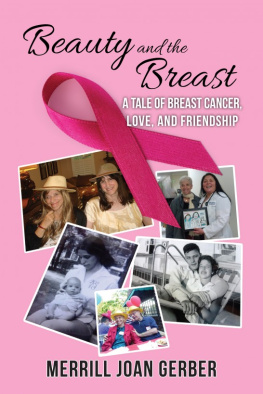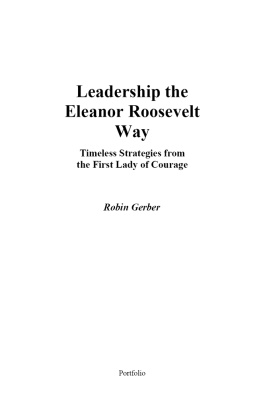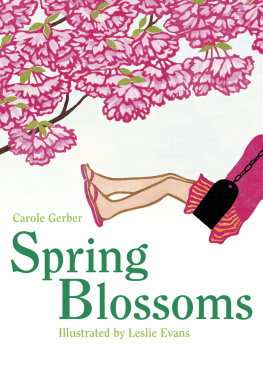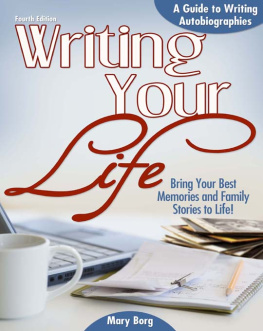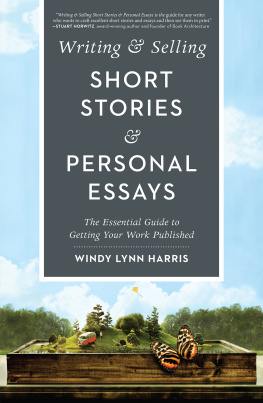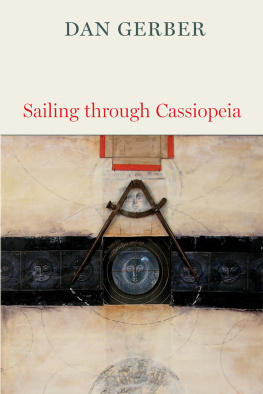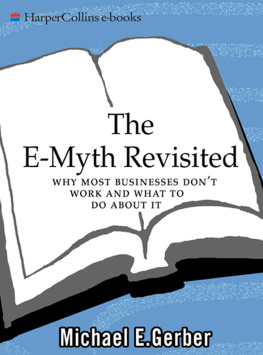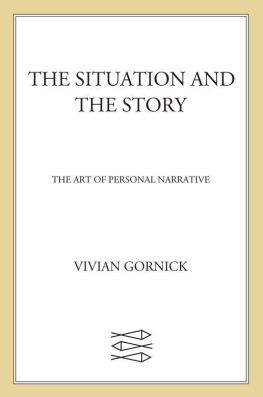Merrill Joan Gerber - Gut Feelings
Here you can read online Merrill Joan Gerber - Gut Feelings full text of the book (entire story) in english for free. Download pdf and epub, get meaning, cover and reviews about this ebook. year: 2014, publisher: Dzanc Books, genre: Detective and thriller. Description of the work, (preface) as well as reviews are available. Best literature library LitArk.com created for fans of good reading and offers a wide selection of genres:
Romance novel
Science fiction
Adventure
Detective
Science
History
Home and family
Prose
Art
Politics
Computer
Non-fiction
Religion
Business
Children
Humor
Choose a favorite category and find really read worthwhile books. Enjoy immersion in the world of imagination, feel the emotions of the characters or learn something new for yourself, make an fascinating discovery.
- Book:Gut Feelings
- Author:
- Publisher:Dzanc Books
- Genre:
- Year:2014
- Rating:3 / 5
- Favourites:Add to favourites
- Your mark:
- 60
- 1
- 2
- 3
- 4
- 5
Gut Feelings: summary, description and annotation
We offer to read an annotation, description, summary or preface (depends on what the author of the book "Gut Feelings" wrote himself). If you haven't found the necessary information about the book — write in the comments, we will try to find it.
Personal essays on writing, life, love, marriage, many of which lead back again to the writing life. Gerber writes of her mentors, her time at Yaddo, writing with children in the house, and much, much more. She includes three pieces originally published as short stories that she feels blur the line between truth and not truth even closer than most.
Gut Feelings — read online for free the complete book (whole text) full work
Below is the text of the book, divided by pages. System saving the place of the last page read, allows you to conveniently read the book "Gut Feelings" online for free, without having to search again every time where you left off. Put a bookmark, and you can go to the page where you finished reading at any time.
Font size:
Interval:
Bookmark:
GUT FEELINGS
A WRITERS TRUTHS AND MINUTE INVENTIONS
MERRILL JOAN GERBER

All rights reserved, including without limitation the right to reproduce this ebook or any portion thereof in any form or by any means, whether electronic or mechanical, now known or hereinafter invented, without the express written permission of the publisher.
Copyright 2003 by Merrill Joan Gerber
Published 2014 by Dzanc Books
Cover design by Steven Seighman
Original Cover Painting by Merrill Joan Gerber
978-1-4804-9020-8
Dzanc Books
1334 Woodbourne Street
Westland, MI 48186
www.dzancbooks.org
Distributed by Open Road Integrated Media, Inc.
345 Hudson Street
New York, NY 10014
www.openroadmedia.com
Contents
ACKNOWLEDGEMENTS
The Truths and Minute Inventions in this book were first published, some in a slightly different form, as follows:
The Lost Airman, Commentary Magazine, June 1998
Look How She Holds His Hand, The Sewanee Review, Fall 2001
The Treasures We Held, The Sewanee Review, Fall 1995
Getting Mother Buried, The Chattahoochee Review, Fall 1998
My Suicides, Salmagundi, Fall 2001
The Harpsichord On The Mountain, The American Scholar, 2002
Follow The Thread Into the Labyrinth: A Fond Recollection of Andrew Lytle, The Chattahoochee Review, Fall, 1988
A Recollection of Wallace Stegner And The Stanford Writing Workshop, The Sewanee Review, Winter 1995
A Month In The Country At Yaddo, The Sewanee Review, Fall 1996
This Is A Voice From Your Past, The Chattahoochee Review, Summer 1997, reprinted in The Best American Mystery Stories 1998
I Dont Believe This, Atlantic Monthly, 1984, reprinted in Prize Stories: The O. Henry Awards 1986
Tell Me Your Secret, The Southwest Review, January 2000
A Few Words Contemporary Authors Autobiography Series, Volume 20, Gale Research, Inc., 1994
This book is dedicated with love to my women friends who write, who read, who study, who paint, women who support me, lift me up, and who are the most astute readers I knowKaterine Gaja, Joan Givner, Susan Koppelman, Jenijoy La Belle, Cynthia Ozick, Lynn Ross and Charlotte Zoe Walker
To my studentsLesley Dahl, Joan Fry, Cathie Sandstrom Smith, Madeleine Swift, and Cherry Jean Vasconcellos
To my bookclubCecilia Fox, Elaine Gaynor, Miriam Kranser, Pearl Weinstein Tyree, Evelyn Robinson, Beverly Sloan, Evelyn Speiser and Connie Taus
Preface
THE FORM IN THE STONE: SOME NOTES ON HOW I WRITE
When I first saw Michelangelos unfinished sculptures of The Four Slaves in the Accademia in Florence, I was struck by the figures which had not quite emerged from the stone. Some seemed in a state of struggle that reminded me of how a story can remain unfinished for a long time, only half imagined. I knew that Michelangelo believed a block of marble already contained the figure within and not till he saw it clearly could he begin to chisel away the extraneous material. In one of his sonnets he wrote:
The marble not yet carved can hold the form
Of every thought the greatest artist has
Perhaps those figures of the slaves remained incomplete for some of the same reasons that stop a writer from going forward with her work. For me, the vision sometimes fades, the idea turns cold or uninteresting, or a more accessible and passionate idea takes my attention.
How I discover the form of a story (as well as the voice with which to tell it, the angle from which to view it) has always been a matter of timing. Sometimes I simply have to get older. Sometimes I discover that what I want to write isnt taking shape, so Im forced to leave the body there, half on the page, half uncreated, still mired in a chunk of uncertainty. There is always the hope that someday I will return to the piece and by working away at it, pushing through the block, I will see the real picture that hides in the general mass of emotion and action Im trying to bring into focus.
Since childhood Ive felt compelled to write about the way things really are. At seven I wrote poems. Not long after, my father bought me a typewriter which I took down to the basement of our Brooklyn house and set on a card table. I remember thinking to myself: Im alone now and Ill write to someone who really understands. Someone, I meant, who was sensitive, compassionate, intelligentall the things I was convinced my relatives and parents were not. I had an early conviction that I wanted to tell the whole truth about what I knewand this could not be done in argument or conversation with those in my family or in discourses to my dog. I could do this only by writing down and telling the truth on paper.
A few years later, my father, who was in the antique business, gave me a blank-paged printers dummy of a book whose title was on the spine: The Heritage of the Bounty. The book had a gray cover (resembling in some ways the copy of Gone with The Wind we had in our house), and I seized upon it and recorded my thoughts in it daily. When I had just turned sixteen, I wrote this entry: I feel I should do something in this life. Most of us leave the big things to others, less lazy than usI want to write somethingto make people understand life better. First I must learn to understand it more myself.
All mixed up in my writing were truths and fictions. Sometimes I could tell more of the truth if I invented a less murky setting for it, or cleared away people who didnt belong in the scene. Now and then I made some exaggerations to bring the truth into sharper relief. (In Lives of the Artists, Vasari writes that Michelangelos method of extracting his four slaves from the stone was to take a figure of wax, lay it in a vessel of water and gradually emerge it and then note the most salient parts. Just so, the highest parts were extracted first from the marble.)
When I created an effect, or emphasized the highest parts, I had in mind the person, or god, or friend who might someday read my work, and would need my help in seeing clearly the essence of the story. Thus, as a child, committed to working out these truths and inventions, I set myself a lifelong job. Flannery OConnor said that if you live to the age of five, you have enough to write about for the rest of your life. This was surely true for me.
Though Gut Feelings is a collection of essays, I chose to include three stories as Minute Inventions. I have always felt these pieces wavered on the line between memoir and story because they seem to contain fewer lies than some of my others stories, although fictional lies are almost always a way of making the truth even truer. The use of the first person in all of them tends to confer an air of confession, a kind of intimacy, as do the titles of the stories, all of them quotations.
This Is A Voice From Your Past are the words a man whispers into the phone when he calls a woman who loved him years earlier in their college days. I Dont Believe This is what the young wife of a suicide tells her sister on the day he is to be cremated. Tell Me Your Secret is the name of a party game designed to seduce confessions and humiliations from its players. These stories emerged nearly full blown from remembered events so that (years after I wrote them) they now beg to be called memoir rather than fiction.
I think its a mistake to dismiss the work of many young fiction writers as autobiographical as if theres something self-evident and shameful about thisas if, when the writer is more mature, shell give up this self-indulgence and get busy using her imagination. For me, there is no imagining without a basis in truth.
Next pageFont size:
Interval:
Bookmark:
Similar books «Gut Feelings»
Look at similar books to Gut Feelings. We have selected literature similar in name and meaning in the hope of providing readers with more options to find new, interesting, not yet read works.
Discussion, reviews of the book Gut Feelings and just readers' own opinions. Leave your comments, write what you think about the work, its meaning or the main characters. Specify what exactly you liked and what you didn't like, and why you think so.

